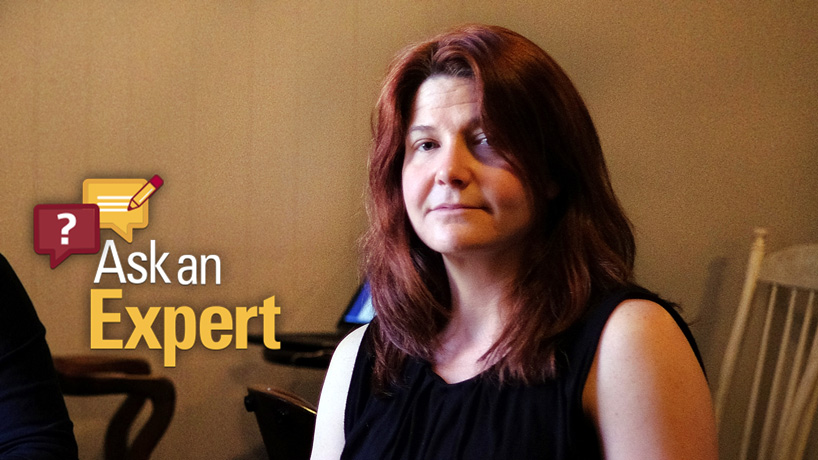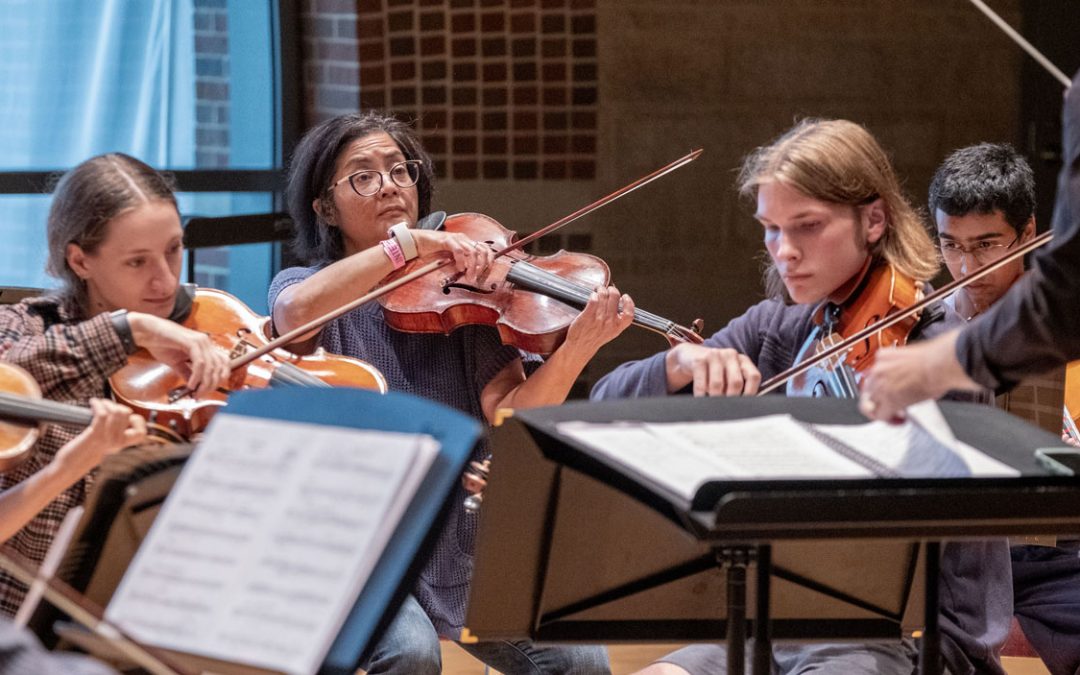
Professor Lee Slocum has done extensive research in police-citizen relations as well as how people’s personal experiences and the environment where they live can influence their attitudes toward law enforcement. (Photo by August Jennewein)
The killing of George Floyd in Minneapolis has sparked protests across America over the past three weeks and adds to a pattern of police violence that has received nationwide attention over the past six years.
There’s been a push throughout large parts of the country to reexamine the relationship between police officers and the communities they are entrusted to serve.
Lee Slocum, a professor of criminology and criminal justice at the University of Missouri–St. Louis, has conducted extensive research on police-citizen relations as well as how people’s environments and their own experiences shape their attitudes toward law enforcement and their willingness to report crime.
Slocum is the co-author of a forthcoming paper titled “The identity prism: How racial identification frames perceptions of police contact, legitimacy and effectiveness” in the Law and Social Inquiry journal. She’s published several other papers on similar topics in the Journal of Research in Crime and Delinquency, Criminology, the Journal of Quantitative Criminology, Youth & Society and Criminal Justice and Behavior over the past four years.
In the latest installment of the Ask an Expert series, UMSL Daily spoke to Slocum about her research on the issues that have created the divide between some police officers and the communities in which they work. She shared insight on what might be done to bridge that gap and whether change seems more likely now than in earlier moments of unrest.
What got you interested in studying the relationships between police and communities?
I’ve been interested in citizen-police interactions for a little while. I’ve worked with some of my colleagues like TJ Taylor and Finn Esbensen and some of our former students, including Stephanie Wiley and Bradley Brick, trying to understand why some people reach out to the police. The reason I was interested in that is because there’s a line of research trying to understand the causes of violence, and there’s an argument that a fair amount of violence is caused by the fact that people don’t trust the police and they’re not willing to seek out their help. When people don’t have access to the law, they essentially have to solve their own problems, and that’s where we see things like retaliation. So, I was interested in taking a step back and trying to understand what has led people to feel that they can’t reach out to the law. What causes this unequal access? That’s how I got into this area. One of the findings in our initial paper was that people don’t call the police if they’ve had negative experiences. It took off from there.
We see these things flare up when there are deaths associated with police, like we’re seeing right now. But how much do more low-level interactions with police contribute to the divide that seems to exist between law enforcement and a lot of minority communities?
There are a lot of things that are contributing to this. The way I view it is that you have these very horrible, tragic events and killings of black people that essentially catalyze emotions that already exist. The emotions and the feelings and the perceptions are rooted in a lot of different things, one of which is daily experiences that people have with the police – the low-level stops, the feeling of harassment and, at the same time, this feeling that the police aren’t keeping them safe. So, these notions of over-policing, aggressive policing, but at the same time, having the police not be responsive to their concerns or their needs. I think that’s one of the underlying factors.
A second one is the legacy of racism, slavery and the relationship of people of color to the police. There’s the broader historical collective consciousness there, which I think we’re seeing a lot of now.
Then there are experiences that are shared from other people. So, people are taught about the police and about the relationship of the police to people like them through their parents, their friends and the way they’re portrayed in the media.
All of these underlying issues get sparked when we see such horrible examples of police violence.
Why do those daily interactions exacerbate this problem?
For a lot of people, police are like the face of the government, so they send messages to people about their place in society and how they’re viewed as citizens. I think that’s one of the reasons why their interactions can be so impactful. A second reason is that they’re supposed to have a monopoly on violence. They’re the only people who should legitimately be able to use violence, and when we see it used in ways that it shouldn’t be, I think that really strikes harm with people.
What are some things law enforcement can do to counteract those negative perceptions that have already been built up in the community, so that they might have better interactions?
It’s really tough for that to be overcome through just individual behaviors. We did some interviews with kids, and they recognize that there are good police officers and what they view as bad police officers. But it’s something more than just the individual actions of officers, so the changes need to be bigger than only changing what officers do. That’s why you’re getting the push to essentially minimize interactions between people and law enforcement and push some of the things that currently fall onto law enforcement into agencies and organizations that might be better equipped to provide those services. Certainly, there are organizational changes within police departments and policy and practices changes that can send a message that departments are changing. Again, I think it has to be a larger change than just the behavior of individual officers or training. But that’s certainly a necessary step.
When you say minimize those interactions, what does that look like?
Aside from stopping aggressive enforcement of minor offenses, there’s been a movement to remove police officers from schools. There’s been what we call the criminalization of discipline where things that used to be handled informally by schools are now being handled by police officers. There are diversion programs out there. If a youth meets certain criteria, then they are not arrested and not processed formally. There’s no real screening process aside from that very strict criteria, so it makes it harder for bias to come into decisions about who gets diversion and who doesn’t. That’s another way. Then, there are diversion centers where people can get services instead of being arrested.
Another thing that some agencies are doing, including in Austin, Texas, when people call 911, is offering callers different options aside from the police. So, instead of sending out a police officer, they might send out a mental health professional to assist with mental health issues.
One other way to minimize harmful interactions is to change the reward structure for police officers so that they are rewarded for engaging with the community in positive ways, not just for engaging in enforcement activity.
Amid unrest, some politicians and policy makers might be calling for stern action. What do reformers say to the concern about letting crime fester or grow if you take a less forceful approach?
Research has generally shown that aggressive policing strategies are not beneficial for crime and, in some cases, enhance crime. There was a study in Nature that looked at this and found that in New York, when there was more aggressive low-level policing, that crime actually increased. There’s not a lot of evidence pointing to the effectiveness of these types of strategies. If they’re not effective, and harm community-police relationships, then why do them?
How challenging is it to get law enforcement leaders to adopt different policies?
Every agency is different, for sure. There are a lot of agencies that do recognize that aggressive enforcement is not the way to police and that there are other ways that might be more effective. Some of the more effective strategies are very targeted policing in very small areas that, instead of just using enforcement strategies, also use problem-solving strategies. What is it that’s causing the issues in these very small areas where crime is concentrated and how can we address those problems?
There’s also been a movement toward what is called focused deterrence, which is focusing your resources on that very small part of the population that is committing serious crime.
In terms of resource allocation, the idea that police want to be effective and want to make effective use of resources by using them in a targeted way is a pretty compelling argument. I think a lot of police departments do realize that and have moved away from aggressive policing strategies.
There have been increasing calls to defund the police, though that appears to mean different things to different people. Is that as radical as it might sound to some?
It can vary. Some people do want to disband the police. There are people who feel that is the only way to have change happen.
What is true is the police generally are the biggest line item on the city budget, and the police often are doing things that they’re not trained to do because they’re the ones that people call when they need help. I don’t think it’s outrageous to shift some resources so other agencies can take over some of the duties of the police department. A lot of departments often have people who are trained mental health providers or social workers accompany police officers. Shifting some of those jobs that the police aren’t best suited for to other organizations or agencies and providing those agencies with adequate funding to perform those services doesn’t seem that radical. But it’s hard to remove money from agencies.
Do you think reform is more likely now than six years ago or 10 years ago?
I think a lot of the conversations are deeper and broader and, in some cases, are moving beyond the police. I think there is an increasing recognition of the smaller daily harmful interactions between police and the community. People are talking about the disproportionate contact and involvement of minorities in the criminal justice system, which is something that we do have very good data on and that we’ve known about for a long time. I think there’s greater discussion of things like the school-to-prison pipeline and the recognition that having police in school and creating contact between youth and police can be detrimental.
We do see pushes for broader reform that isn’t just about changing the behavior of individual police officers, which as I said, is really important. I think there’s also a recognition that a city like Minneapolis had put in place a lot of reforms and that George Floyd was still killed by a police officer. I think the conversations are broader because people see that the reforms haven’t worked as intended.














